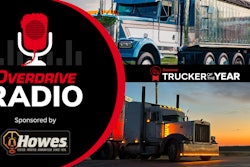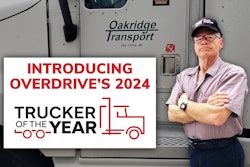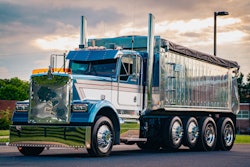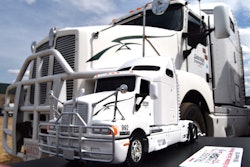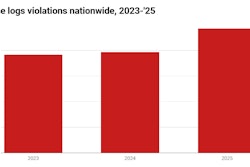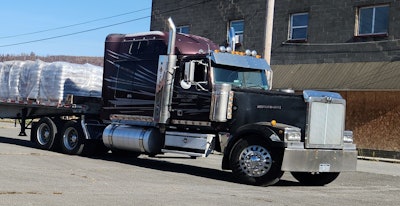
Owner-operator George Kincaid, headquartered in Quinwood, West Virginia, has built a stable of wood and landscaping products supplier customers in and around his Appalachian region almost by virtue of plain old stubbornness.
Building business in trucking, carving out a niche wholly on his own with authority, has felt often enough like "the world's against you, pretty much," Kincaid said, reflecting on the career thus far.
Jim C. Hamer Co. Shipping Manager Viola Epling, among Kincaid's customers today, has something of a term of endearment for the owner-operator. "She calls me the 'born loser'," Kincaid said with a laugh. She's seen him persist, thrive through the ups and downs of business hauling in the region, demand subject to the whims of construction and landscaping markets.
It's likely her phrase for a man who’s been through a lot yet always finds a way forward, to come out the other side with solid relationships with companies like her own and his business intact and thriving.
Reflecting on the uncertainty all around the nation in early April as tariffs and/or the threat of such ping-ponged around the world, Kincaid was stalwart.
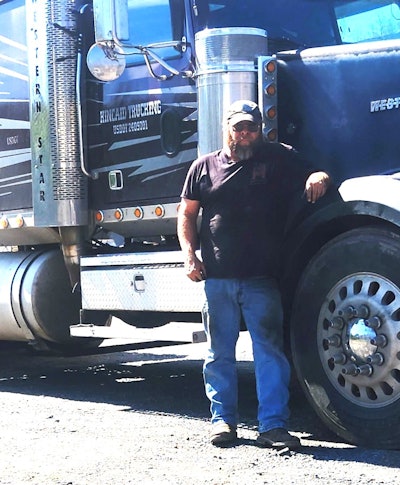 Owner-operator George Kincaid
Owner-operator George Kincaid

For flatbed freight indicators, the picture has been mixed since the beginning of April. Spot market volumes for flatbeds trended down for a couple of April weeks after rising all throughout the first months of the year. Spot rates broke a long upward streak nationally just last week, as contract market rates continued to adjust upward with the early-year rise.
Spot volumes, at once, ticked back up in the most recent week.
[Related: Tariffs' impacts on freight markets already being felt]
Kincaid referenced a famous scene from the old "Smokey and the Bandit" movie to illustrate his perspective -- a determined outlook toward all manner of challenge that comes his way: “We ain’t never not made it yet,” he said, again with a chuckle. "That’s what I tell myself."
That perspective's evident in his principal advice for less-seasoned owner-operators coming up behind him in business, too. "Don’t give up. You've got to be persistent," he said. "There will be rejections and rough patches, but keep an eye on the big picture and where you want to be. Keep your eye on your goal, and don’t let the little stuff" derail you. "You’ll look back on it and laugh, ultimately. If it was easy, everybody would do it."
Owner-operator Kincaid's not where he wants to be just yet, but he's on the haul to get there. George Kincaid is Overdrive's April Trucker of the Month, putting him in the running for the 2025 Trucker of the Year award, and this is his story.
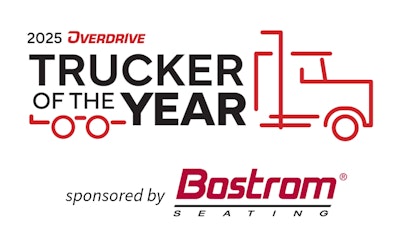 Overdrive's 2025 Trucker of the Year program, sponsored by Commercial Vehicle Group and Bostrom Seating, recognizes clear business acumen and unique or time-honored recipes for success among owner-operators. Nominations are open for exceptional owner-operators, whether leased or independent. Nominate your business or that of a fellow owner (up to three trucks) via this link for a chance to win a custom replica of your tractor and a new seat from Bostrom and CVG.
Overdrive's 2025 Trucker of the Year program, sponsored by Commercial Vehicle Group and Bostrom Seating, recognizes clear business acumen and unique or time-honored recipes for success among owner-operators. Nominations are open for exceptional owner-operators, whether leased or independent. Nominate your business or that of a fellow owner (up to three trucks) via this link for a chance to win a custom replica of your tractor and a new seat from Bostrom and CVG.
Born to truck
Growing up in West Virginia, George Kincaid worked for a local furniture store right out of high school in 1992, yet always knew what he wanted to do with himself long-term. Trucking for him and his younger brother was "pretty much all we wanted to do growing up," he said.
By the time he turned 21, he was delivering regionally for the furniture store. "They started sending me all over the South in a two-ton six-wheeler," Kincaid said. "I went to Georgia a lot into the carpet mills."
Over time, he graduated to bigger trucks, via a connection his father had to a trucking business. After Kincaid and his brother both got their commercial learners permits, they hauled in the operation of Paul Holland, a builder who got into trucking in the 1990s, according to Kincaid. The owner-operator learned while hauling hay with Holland, as the small fleet owner "helped us get our CDLs and everything," Kincaid said, himself in a 1985 Freightliner FLC he pulled in-state in West Virginia. Wood pallets, too, "going to these hole-in-the-wall farm stores back in these hills" in West Virginia.
"You’ll learn to drive a truck doing that," Kincaid said. It's "not the interstates in North Carolina."
After a couple of years getting the feet wet with Holland, a few more spent working a loader for a sawmill gave way to hauling work for Holland again for a short time, then another small fleet owner running logs locally for almost a decade. The Great Recession put a big damper on the log-haul business, Kincaid said, then, with that owner, then another who held on a bit longer, going out of business.
Times were tough, yet Kincaid's brother's trucking work provided an outlet for George up through 2013 when he purchased his first truck, a 1992 Kenworth W900 he found pushed off into a corner of a Kenworth dealer's lot, "forgotten," Kincaid said. "It needed a radiator and needed some tires," likewise a re-bushing of the back end, which Kincaid did himself along with a new exhaust. The truck "had been used for logging," he added, and he put a "new bumper on it, and the mudflaps where they’d been torn off."
[Related: 'Keep digging' with Dice Mayhem's Trucking: Growing dump roots toward small fleet success]
Kincaid's growing mechanical knowledge, a product of his long enthusiasm for all things trucking, came in handy at the point of sale. "I offered a good bit less than they were asking for it," he said, pointing out the work it needed.
The dealer, according to Kincaid: “I can tell you know what you’re talking about or I’d have walked off by now. ... Are you going to buy it today?”
Ultimately, he did. It "was a decent old truck," Kincaid said. "It just needed some TLC."
The rig would serve his one-truck business for the next five years, hauling logs for a brief period before getting his authority and working directly with a couple local sawmills in the area pulling lumber on his first flatbed, also purchased in 2013, and "whatever else I could find on the side."
To this day he works with those sawmills with his current flatbed, occasionally hauling byproducts in one of those companies' tipper trailers, as pictured below.
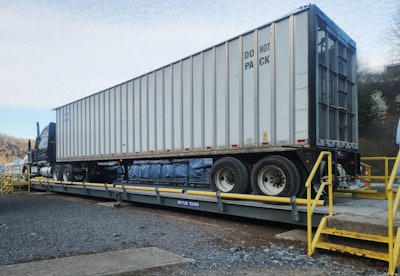 Kincaid's current rig is a Western Star he's owned since 2018, a 2001 4900EX built in 1999 as a Millennial Edition and powered by a 550-hp 6NZ Caterpillar.
Kincaid's current rig is a Western Star he's owned since 2018, a 2001 4900EX built in 1999 as a Millennial Edition and powered by a 550-hp 6NZ Caterpillar.
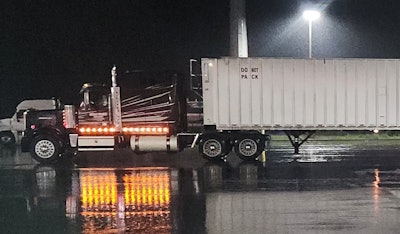 The Western Star he purchased from another individual owner who'd let it sit for a while. "It’s been a great truck, mechanically," Kincaid said. "One of those mystery motors. The guy I bought it from never did anything to it." He couldn't swear to it, but "I bet it's been overhauled," that prior owner told him. It's closing in on 2 million miles today.
The Western Star he purchased from another individual owner who'd let it sit for a while. "It’s been a great truck, mechanically," Kincaid said. "One of those mystery motors. The guy I bought it from never did anything to it." He couldn't swear to it, but "I bet it's been overhauled," that prior owner told him. It's closing in on 2 million miles today.
In the most recent years, Kincaid has focused his customer efforts on more diversification, keeping his eggs out of just a single basket. From increasingly hauling for manufacturers like Viola Epling's company, and mulch and topsoil for landscaping from others, he's building for future continued success.
He's jumped to the spot market via load boards and the like this past year, too, "which I've never done much before," he said, as a means of keeping eyes out for new opportunity, and filling gaps between busy seasons for regular customers/brokers.
He's quick to fill a local need doing what he learned early on -- taking loads with less-desirable, shorter miles tallies and difficult destinations, yet at higher rates to the truck, ultimately.
"Some of these places are way back in the hills on the winding two-lane roads, and not many people want to take" loads there, as Kincaid put it. While the "really easy ones get snatched up quick, the ones that are a little less desirable" you can name your price, sometimes. "Anytime you can make decent money and stay closer to home, that’s a win, I think. If I can make what I need going across the parking lot, why go across the country?"
Viola Epling certainly appreciates the owner, and enjoys "working with George," she said. "He is very happy to accommodate any shipping need I may have, especially if I call him with an urgent load -- he will try everything in his power to help me."
A rare breed, she said of Kincaid. "Very few drivers are this helpful. ... He pays attention to our product and how best to represent it to our customer."
[Related: How trucking's 'supposed to be done': Trucker of the Month Kenny Wingate, Southpoint Exchange]
Power of positivity
Asked directly whether he felt he'd gotten what he wanted out of trucking to date in terms of quality of life, owner-operator Kincaid wouldn't say he was completely satisfied, that's certain. "I'm not going to say it's been great all the time," he said, "but I haven't been starving, either."
He lets a measure of guarded positivity guide him in diligent efforts to get where he wants to be as a business owner, fundamentally.
The line he referenced above from Smokey and the Bandit, after all -- We ain't never not made it yet -- isn't the full quote of the Bandit talking to the character Cledus Snow. It starts this way: "You got to stop thinking so negative, son."
Along the way, to be "doing something you truly enjoy doing," Kincaid said, "means a lot right there."
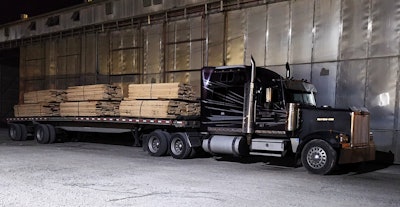 Lumber and other runs throughout the year take Kincaid all around West Virginia, but also into neighboring states. "I live in the bottom part of the state," he said, and lumber commonly takes him north to Pennsylvania. "I might get a load to come back toward one of my regular mills," he said. "There's two or three out in Virginia out around Richmond and Culpepper, places like that," where he knows he can reload, too, to bring back toward home.
Lumber and other runs throughout the year take Kincaid all around West Virginia, but also into neighboring states. "I live in the bottom part of the state," he said, and lumber commonly takes him north to Pennsylvania. "I might get a load to come back toward one of my regular mills," he said. "There's two or three out in Virginia out around Richmond and Culpepper, places like that," where he knows he can reload, too, to bring back toward home.
Unless it's dead of winter and he just doesn't want to fool with it, owner-operator George Kincaid performs all maintenance and repairs on his own. When's he not done something himself, he's found, "nine times out of ten you have to go back over it," yet "as I’m getting older I wouldn’t mind paying others for it."
Kincaid turned 50 in October last year.
He changes oil at a conservative "ten to twelve, maybe fifteen thousand miles," he said, though he knows people in more OTR operations who extend drains to effect. "That's about as far as I'll take one."
Greasing regularly helps maximize the life of the truck's components. "I'm up under it every weekend at least checking things out," he said. "During the week on trips," too, he's "constantly looking to spot trouble before it starts."
Just a couple weeks before he spoke to Overdrive in early April, for instance, he was "putting new steer axle brakes" on the Western Star when he noticed "a little oil seeping from a wheel seal. Might as well go ahead and do that while we're here," he said. He thought to clean wheel bearings while he was at it and noticed outer bearings showing some wear, so he "slapped some new wheel bearings in it."
He's caught damp areas around wheel seals while under the truck greasing in past. "It's going to be a problem before too long" when he sees it, he knows, likewise an exhaust pipe with a small hole in it. "Little stuff like that. I'm always looking at everything. Experience is the best teacher. Each time you learn something and put it in your memory bank."
Soon enough, you'll be "fixing it before it even becomes a problem," Kincaid said. To that end, he's monitoring oil condition with about 1.8 million miles on the Western Star's odometer. Big work he's needed thus far includes a 13-speed transmission put in, likewise a clutch.
[Related: They told him he'd fail but he proved them wrong: 2023 Trucker of the Year Jay Hosty]
"I could do an in-frame overhaul myself," Kincaid said, if the Caterpillar needed it and, more importantly, "I wanted to do it." He's got a mechanic in Summersville, West Virginia, though, who "does great Caterpillar work" about 30 miles from his home in Quinwood. Kincaid's not afraid to pivot from his usual run of things when it's necessary.
For 2024, for instance, he changed insurance agents after his entire time in business with the same company. He was looking at a proposed insurance renewal with a substantial increase from Progressive. His new agent, Penn Summit Insurance, got him over to Great West for what amounted to a $5,000 savings, he said, "with actually better coverage. ... Everybody accepts Great West on your cargo."
All in all, he's most proud of what he's built because he's done it, simply put: "To have done it and put my name on the door and doing something that I want to do." He's appreciative for the ability to "get out and relate with people. I’ve met a lot of great people along the way. ... I’ve enjoyed it all."

